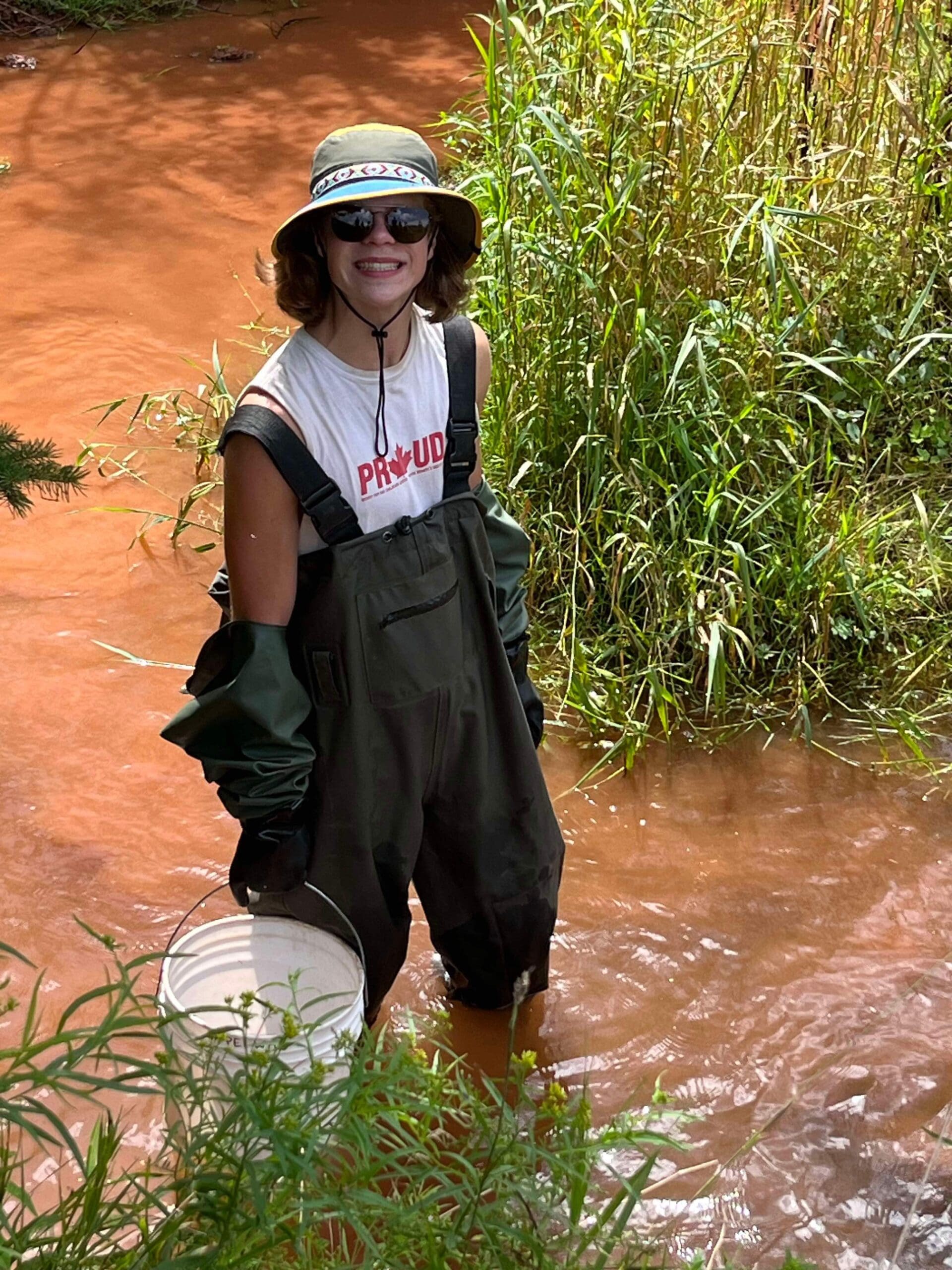
By Province
By Region
By Impact Area
By Program
By Approach
Attend an Event
Be a Donor
Be a Volunteer
Be a Partner
News & Media
Resources
Who we are
What we do
Resources
Nout Geurts is a water and wetlands enthusiast to his core. He has a keen interest in fish and speaks with enthusiasm about ocean science and invasive wetland species.
As a student at Charlottetown Rural High School, a Ducks Unlimited Canada (DUC) Wetland Centre of Excellence (WCE), his love of wetlands grew stronger. Alongside classmates, he planted and transplanted trees in the nursery, undertook environmental science projects and invasive species removal, cleared Hurricane Fiona trees, and led Grade 4 students on wetland field trips.
Geurts’ outdoor classroom is part of an estuary called the Ellen’s Creek watershed. Nearby rivers and streams connect to the estuary and ocean creating a unique tidal wetland environment, perfect for eager students to build environmental restoration projects and learn more about this special ecosystem.
Outside of school, Geurts got involved in his community as well, working with the P.E.I. South Shore Watershed Association and taking part in initiatives with UPEI ClimateSense.
Geurts’ love of nature has pushed him to take an active role caring for the environment around him in P.E.I.
“My favourite things still are just going fishing, being outside, and not only do I want to be able to enjoy that in the future myself:I also want other generations to be able to appreciate the things that I’ve been able to see so far and hopefully will be able to see in the future.”
Geurts is keenly aware of the challenges facing P.E.I. wetlands and aquatic ecosystems and he’s motivated to do his part to improve and conserve that environment.
“We have lots of problems nowadays with climate change, invasive species and endangered species,” he explains. “The biggest thing is we just want to make sure that it’s a good healthy habitat.”
Many of the Charlottetown WCE projects focus on addressing the invasive species that have established themselves in the Ellen’s Creek watershed. Geurts explains that they would remove invasives like nightshade and buckthorn and plant native species in their place.
During the annual Charlottetown Rural Buckthorn Beat Down, classes take to the wetlands with clippers and shovels to remove the invasive species. Motivated by the class’s competitive spirit, Geurts and his friends were soon attempting to see who could remove the largest buckthorn from the marsh.
“We planted all types of different plants that are native to P.E.I. and P.E.I. has a big silt problem because we’re just sand, even our stone is sandstone. So, we put in brush mats to help catch silt to make sure that the water is running a lot better,” says Geurts.
Throughout his classes, Geurts was supported by Carolyn Huggan and Rob Redmond, the WCE leaders at Charlottetown Rural.
“They really encouraged everybody to try different things, even if they didn’t know much about it, or they hadn’t done something before, they really encouraged us to try and learn more,” says Geurts.
This supportive environment and the students’ curiosity allowed Geurts and his friends to build brush mats to control silt in the Charlottetown Rural wetland.
“They let us go outside and just work on them. They just said, ‘You guys go out and give it a try.’” Geurts continues, “that freedom to try different things was really great and I definitely learned a lot through that.”
“[Huggan and Redmond] were always there to help or if we had any questions, they’re always there to answer the questions and if they didn’t know the answer, they’d help us find it out.”
Geurts was uncertain about his presentation skills after time spent learning online and being isolated from classmates during COVID, but sharing the wetlands with students reignited a love of science communication.
Through mentorship, Geurts says he became more social and outgoing in his presentations. DUC staff who have joined these presentations have commented on the enthusiasm and knowledge he shares with younger students as they tour the wetland.
“It was really cool to see how interested these kids were in the same things that I was interested in. And I could share little facts with them, and it was cool to see how much their eyes lit up about these little facts,” says Geurts.
Geurts credits the WCE program at Charlottetown Rural for making him who he is today. The program helped him become even more confident and curious, and allowed his passion for wetlands to grow.
“I’ve been working there for so long, it’s become a really big part of who I’ve become,” says Geurts. “I really enjoyed my experience there and everybody that I worked with was great.”
Geurts hopes that others are motivated to protect the natural environments around them and that we can foster a deeper understanding of environmental responsibility and how we can all have a positive impact.
Geurts is attending his first year at the University of Prince Edward Island studying biology and is looking forward to continuing to work outside, with fish and near the ocean, while completing his studies in marine science in the Netherlands.
Wetland Centres of Excellence engage and empower young people in meaningful nature-based experiences.
With her debut book, author and Ducks Unlimited Canada Feather Society member Diane Bedford is shedding light on ducks’ migration journeys, while giving back to conservation.
Maija Fotr finds success through experiential learning in Aldershot School’s ECO Studies program
Makaela Gilbert shows leadership and dedication at Ducks Unlimited Canada’s Wetland Centre of Excellence.
Support us
We need your help to conserve water, wetlands, and wildlife for the generations of tomorrow.
Donate
We value your input. Help us improve our website by providing feedback.
Submit Website Feedback
Administration
Get in touch
1 800 665-DUCK (3825)
Ducks Unlimited Canada
PO Box 1160
Stonewall, Manitoba, Canada
R0C 2Z0
For more information, click here.

Recent Comments